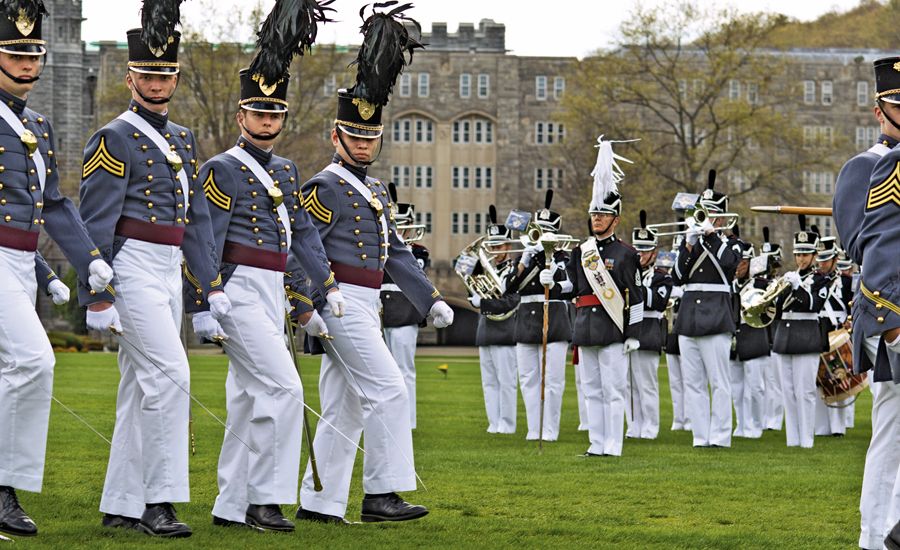It was never going to happen. Not even my family was planning to make a big deal about my retirement from the Army. After all, I was a humble chaplain, not a five-star general. No one would be unveiling a statue in my honor. The president wouldn’t be calling.
Still, I’d served my country for 36 years, on active duty and in the reserves. In Vietnam and Oman. I’d graduated from West Point, the class of ’64. My service seemed worthy of some kind of recognition. I didn’t want to just slip away unnoticed.
I had this crazy idea, a kind of Walter Mitty fantasy, the most perfect send-off I could imagine. I wanted a parade.
Not just any parade. I could picture it: Me, Chaplain Colonel Arthur Mack, in my shining moment, standing tall in my dress uniform at West Point, shoes spit-shined, looking over a vast green field while cadets marched past, each company snapping off a salute, a band playing the Army song.
I know. Dream on. The thing was, I’d had this idea way back when I was a plebe, marching across the Plain, our parade field, surrounded by the beauty of the Hudson Valley. We marched at least three times a week, drilling until we could step off perfectly in sync.
It was serious business, even more a part of our training than marksmanship and close-quarters combat. It was about discipline and precision. Each company was graded on its performance.
Of course, it was partly pageantry too. At West Point, parades were part of special occasions, the ultimate sign of respect. We marched in President Kennedy’s inaugural parade, and for General Douglas MacArthur’s farewell address.
There were less historic occasions as well, such as when staff or faculty retired. That’s where I got the idea. One sweltering May afternoon standing at attention on the Plain, I couldn’t help but think how wonderful it would be if someday the cadets would march just for me.
That would be the all-time best way to retire. I smiled at the thought. I was 22. I couldn’t really imagine being old enough to retire.
I graduated and went on to Ranger school. In 1966, I was sent to Vietnam. My heavy-artillery regiment was stationed in a village outside Saigon. I came home a different person. I’d seen the effects of war.
I loved the Army, but I wanted to find a different way to serve, a way of connecting more deeply with other soldiers. I prayed about it and talked to my minister about becoming a chaplain. “I’ll recommend you for ordination,” he said.
Now I could look back and see the path that God had set out for me, every assignment—from Fort Monroe, Virginia, to Fort Richardson, Alaska—leading me to this point in my life, pastoring a small Episcopal church near Buffalo, New York, full-time, and ministering at a Reserve hospital in Niagara Falls when my unit had drill weekends.
The camaraderie of a military unit, the opportunity to be a comforting presence for so many wonderful young men and women, to be part of something greater than myself…I was going to miss all that. At least with a parade I could go out with a bang.
But as my retirement date, October 1996, drew near, I had to face the facts. I was nobody. The idea of a parade just for me was ridiculous.
Then I saw a notice for a chaplain-training conference at Fort Dix, New Jersey. It was in September, weeks before my time was up. I could stop by West Point on the way back to Buffalo.
I might be able to watch the cadets practice marching. I could stand in the shadows and pretend they were marching for me. When I left for Fort Dix, I packed my dress uniform, just in case.
By the last day of the conference, all I could think about was going to the academy. I got my hair cut and shined my shoes until I could see my reflection in them. I was excited, but I felt a little silly. It wasn’t like anyone was expecting me.
I got to West Point about noon. At the Office of Graduates I asked if there were any parades scheduled. “Yes, sir, there’s one at sixteen hundred.”
I had lunch at the officers’ club, then strolled over to the chaplain’s office and chatted for a while. I spent the rest of the afternoon walking the grounds. By 4:00 p.m. the long-awaited time had arrived.
I stood at the bleachers. The Plain was empty. I waited for 15 minutes. Finally I saw a few cadets clustering around a microphone. I walked over. When they saw me in my uniform, my silver eagles shining in the sun, they stood at attention and gave me a sharp salute. I returned their salute.
I told them I was a sentimental old grad who would be retiring soon. “I just came to see the parade,” I said.
“Sir, there is no parade today,” one cadet said. “There will be one next week when General Vessey receives the Thayer Award.” I tried to hide my disappointment at the news, but it felt as if my whole body were wilting.
“We are having a practice to prepare for the visit and we need someone to fill in for the reviewing officer,” she added. “Sir, would you be willing to do that?”
Inwardly ecstatic, I calmly asked, “What exactly would I do?”
“Stand on this spot and when it’s time I’ll signal you to give the command ‘Pass in review.’ The cadets will pass in front of you and salute.”
I strode to my spot. One after another the companies of cadets marched onto the field. In my strongest command voice I gave the order, “Pass in review.” In perfect formation the cadets marched in front of me and saluted, the band booming in the background.
I doubt any five-star general could have felt more excited and honored than I did at that moment. It was the retirement parade I’d always dreamed of, but never imagined possible. I lifted my eyes to the sky. Thank you, Lord, for looking out for your servants, even this not-so-humble one.
The cadets pivoted and marched off the field, a long gray line I would always be a part of.
Download your FREE ebook, True Inspirational Stories: 9 Real Life Stories of Hope & Faith.






